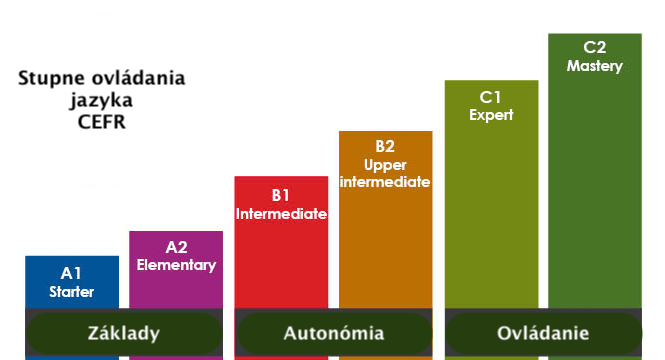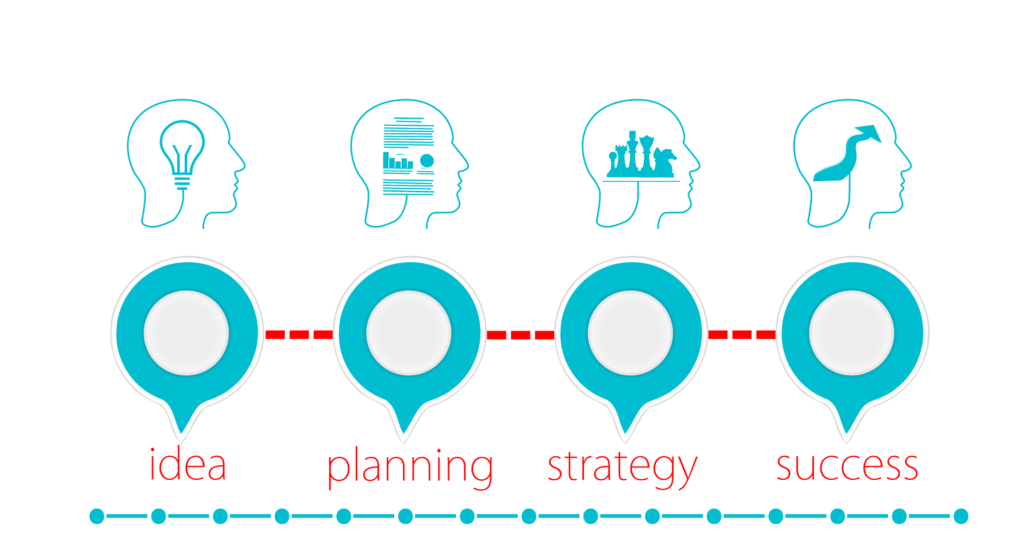
I believe many of you have engaged in some form of sport at different stages in your lives, whether it was running, swimming, yoga, or football. Because of this, I’d like to explain learning a foreign language (its levels and expected outcomes) by drawing parallels to sports activities. Whether we like it or not, regular training is crucial in both areas.
You might already be familiar with language levels, but let’s briefly review them.

Source:
Prečo sa venujem práve téme úrovní? Počas mojej dlhoročnej praxe sa neustále stretávam s nerealistickými predstavami študentov a ich následnou frustráciou, ktorá nastáva, keď očakávania a používané metódy pri učení sa, spolu vôbec nekorešpondujú a prirodzene nevedú do vytýčeného cieľa.
Vráťme sa k pripodobneniam učenia sa jazyka a športu a spomínané úrovne sa pokúsime priblížiť napríklad k futbalu.
Úroveň A by som prirovnala k takému futbalu, ktorý hrajú deti na ulici. Stretnú sa, hrajú sa s loptou, strieľajú na bránu. Z futbalovej techniky a zručností využívajú minimum a podobne je to aj s pravidlami. Aj napriek tomu, má takýto spôsob hry svoje čaro a prináša zúčastneným radosť z pohybu ,prispieva k celkovej telesnej zdatnosti a kondícií.


English is like sports: the more seriously you take it, the greater places it can take you!
Prenesme teraz spomínané informácie do oblasti cudzieho jazyka. Ak je našim cieľom využívať ho rekreačne, v neformálnych situáciach s limitovanými pravidlami, super. Dostanete sa tam relatívne ľahko aj sami, napríklad pomocou aplikácií a Občasnou hodinou s lektorom, prípadne jednoduchou výmenou niekoľkých fráz v obchode či so susedom alebo kolegom. A ozaj, nech nezostaneme len pri jazykových apkách, to je potom ako by ste hrali video hru. V takej hre možno viete strieľať ako Messi, ale určite by ste ani po hodinách a hodinách na počítači sa nedostavili na ihrisko s očakávaniami, že odohráte celý zápas ako on. Prečo to potom očakávame pri učení sa cudzieho jazyka?
Druhou zastávkou je úroveň B. Tú by sme mohli prirovnať k amatérskemu klubu. Pri hre je už potrebné využívať širšie spektrum techník, dôležitosť nadobúda dobrá kondícia, tréningy na pravidelnej báze a pravdepodobne by sa zišiel aj tréner. S cudzím jazykom je to podobne. Ak ste to vďaka škole, kurzu či usilovným samoštúdiom dotiahli až tu, znamená to, že poznáte pravidlá a máte slušnú zásobu slovíčok. Pravidlá sa snažíte rešpektovať, slovíčka používať, ale nie vždy to v reálnej komunikácií vyjde. Viete, akú gramatickú štruktúru by ste asi mali použiť, no v tom kľúčovom momente stratíte kontrolu a výsledná veta je iná. Viete si však poradiť, opraviť sa, dovysvetľovať. Nie je to hladká a priamočiara cesta, ale dôležité je, že sa navzájom pochopíte.

You’ve made it this far… the next piece in the puzzle is: KEEP PRACTICING!
V športe, ktorý robíte rekreačne alebo amatérsky, by vám ani nenapadlo myslieť si, že po dvoch až troch rokoch hrania a tréningov vo voľnočasovom režime to dotiahnete na olympiádu. Ak by vám to niekto povedal, asi by ste si o ňom pomysleli svoje. (Možno niečo v zmysle nech sa preberie alebo niečo zmení v prístupe.) V jazyku, ktorému sa venujete vo voľnom čase a zväčša sporadicky, platí to isté. Ak cudzí jazyk nie je vaša priorita alebo súčasť každodenného života, nečakajte, že hravo vykľučkujete z akejkoľvek témy za akýchkoľvek okolností.
Prejdime k úrovniam C, vysnívanej méte takmer každého študenta. Máme na mysli už vrcholový šport, ktorý sa vykonáva na základe systematického plánu, pravidelných tréningov pozostávajúcich z celej škály cvikov, drilov a iných aktivít. Študujú sa zápasy, techniky protihráčov, pracuje sa so psychológom A asi si viete predstaviť, že životný štýl zahŕňa vypracovaný jedálniček na mieru a spánkový režim, ktorý je vypočítaný tak, aby daný športovec dosiahol maximálne výsledky. Nie je to už len o kopaní do lopty a behaní po ihrisku. Všetko zohráva dôležitú rolu a výsledok stojí na detailoch.

So, be consistent, and intentional.
Asi už viete, kam smerujem. Ak chcete rozprávať v cudzom jazyku s ľahkosťou a mať čo povedať prakticky k akejkoľvek téme, chce to spraviť si z učenia sa prioritu a súčasť života. Chce to systematické štúdium a hlavne pestrosť zdrojov, techník a aktivít. Samotné konverzačné hodiny na voľnú tému, poväčšine z bežných oblastí života, vás tam určite nedovedú. Tie voľné konverzačky sú akoby vám niekto poskytol trávnik a hodil vám loptu. Takému trénerovi by sa profi športovci nepoďakovali.
Ak niekedy zas pocítite frustráciu z vášho jazykového výkonu, zamyslite sa a položte si otázky:
Pozrite sa, či vaše odpovede spolu ladia, alebo je tam nejaký rozpor. Ak chcete mať z učenia sa a z používania jazyka radosť, urobte si v tom poriadok a zmenťe niečo – upravte ciele, začnite sa učiť novými spôsobmi, začleňte jazyk do vášho života. Možno sa vám hneď v tomto momente ,,natíska” otázka, ako dlho bude presun do inej/ vyššej ligy trvať. Ale to je otázka na iný článok. Zatiaľ, ako sa vraví v angličtine ‘enjoy the ride’ alebo jednoducho ‘užívajte si cestu’.


